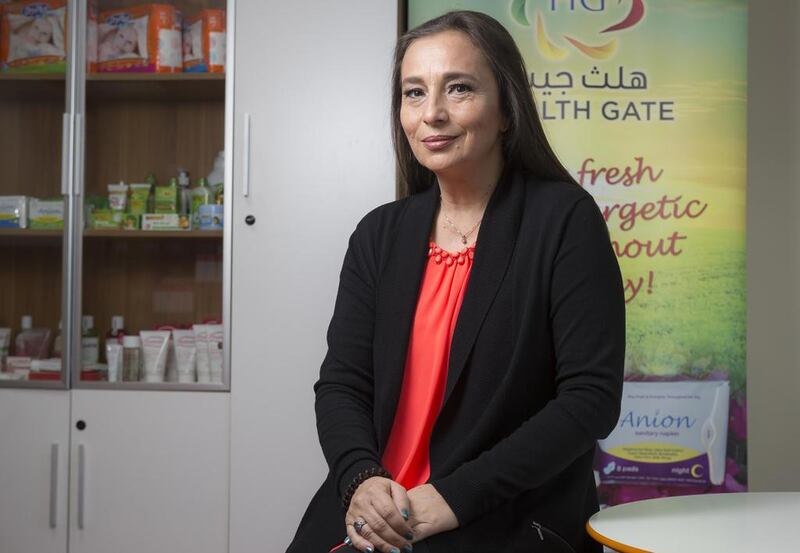It is a big claim, but Maya Alghaith is certain of it. Joining the female entrepreneurship programme Women-able has been the best decision of her business life.
“I never realised how much I would learn during this process. The mentors’ guidance makes you want to be the best in your field,” says Ms Alghaith, the co-founder of Health Gate, which designs and produces its own natural sanitary products in the UAE.
“They don’t give you the answer. They don’t hold your hand. But they make you dig deep within yourself and find what is important to you, why you are doing it. All the ladies in the group are like-minded and you can rely on them.”
Ms Alghaith, who is from Bulgaria but has lived in the UAE since 1999, launched her company at the end of 2013 and currently sells 10,000 packs a month of her breathable sanitary products. But Ms Alghaith, who says the company had a 160 per cent turnover increase from 2014 to 2015, was looking to expand into new markets when she heard about Women-able at the start of this year.
The initiative, run by the training and coaching company, grow.ME, in association with the Cherie Blair Foundation for Women, launched in March. It provides education for female entrepreneurs, mentoring by business owners, introductions and guidance plus a support network.
It attracted 145 applicants when the programme launched in February, 100 of whom were accepted. There are now 25 finalists left.
“We have three categories of women who we are working with which is what makes our programme quite different,” says Maria Pearson, the chief executive of grow. ME.
“A third of the women we selected had an idea, but they didn’t know how to take that idea forward. We had women who had started within a one to three-year time frame but they got stuck. They started and launched and had a couple of customers but literally stopped. Then we had small businesses that were looking to grow and scale and looking to expand into new markets or bring a new product to market.”
Nida Sumar is a member of the third category, having already founded Keza, a company which produces a dining app currently in the beta testing phase. It allows diners to view and review a restaurant’s dishes, plus place an order, call the waiter, split the bill and even pay for it, all from a mobile phone. It is expected to become more widely available in December.
“You are taking away the wasted time,” says Ms Sumar, 28, whose family is from Pakistan, although she was born and raised in the UAE.
She came up with the idea after a disastrous dinner with friends at a top Dubai restaurant a few years ago when their orders became mixed up, inspiring her to develop the business last November.
Ms Sumar, both a chartered financial analyst and a trained chef, had experience working in her family business before she set up her company but was looking for support.
“I do have experience in a few areas. However there are other things, like the network. Those are things I didn’t get exposure to from the family business, which closes you down in a limited network,” she says.
For Health Gate’s Ms Alghaith, the opportunity to take her business to the next level inspired her to apply for Women-able. She stumbled upon her business idea while working as a manager for an automobile company. A good friend was diagnosed with cervical cancer in her early 30s and wanting to find out why, Ms Alghaith embarked on a search for answers.
“I realised that it came down to what we put on our bodies,” she claims. “Everyone checks the ingredients of what we eat, what we drink and what we wear and the cosmetics we use. But the one thing we never check is what we use every month, our sanitary products. Manufacturers can use anything in making them and the trouble is that most of them contain dioxin, a toxic [substance] stronger even than arsenic.”
Early on in her journey she read about negative ions, atoms charged with an extra electron which are generated naturally by evaporating water, ocean surf and waterfalls, and the positive influence they can have on our health.
She decided to combine the two by creating sanitary products with a negative ion strip.
“We create wonderful sanitary napkins free of pollutants and chemicals that actually improve our health and well-being,” she claims. “Anion has a signature green stripe that contains high concentrations of negative ions.”
The two entrepreneurs and the rest of the finalists are now learning about finance, marketing, pricing, how to talk to customers, close a deal and pitch to investors – which will come in handy on November 21 when the programme comes to a close.
“We will pitch to a host of people who could be investors or potential clients, people from the ecosystem, so this is a programme trying to get us to be ready for that day,” adds Ms Sumar. “If someone invests in your company then that’s a huge win.”
business@thenational.ae
Follow The National's Business section on Twitter






